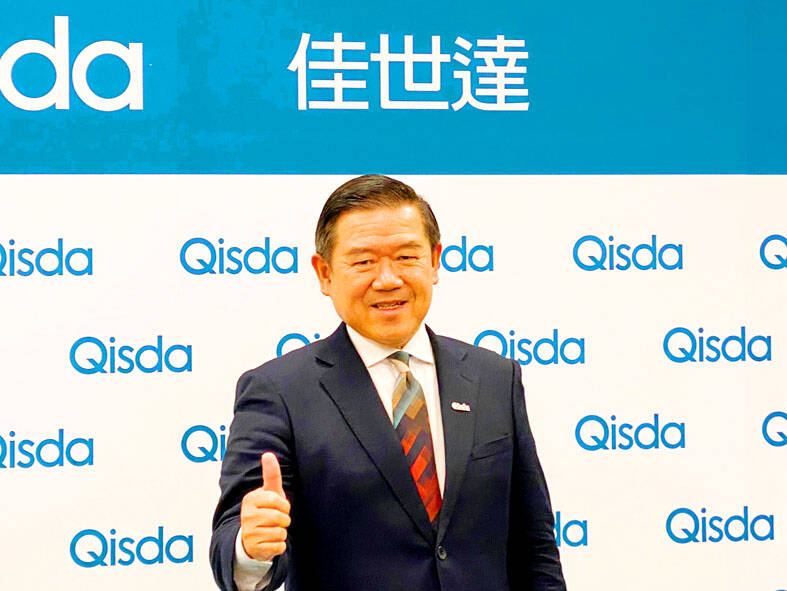Liquid-crystal display and projector manufacturer Qisda Co (佳世達) on Thursday said it expected revenue this quarter to be flat or slightly higher than last quarter amid slowing front-loading demand and tariff uncertainty.
Revenue this quarter could still edge up from the previous quarter aided by seasonal upticks, Qisda chairman Peter Chen (陳其宏) told an online earnings conference.
Revenue last quarter rose 7 percent sequentially to NT$53.46 billion (US$1.78 billion).

Photo: CNA
The outlook for the fourth quarter remains uncertain, depending on the outcome of a Section 232 investigation under the US Trade Expansion Act of 1962, Chen said.
As Taiwanese information and communications technology (ICT) products were previously exempted from US tariffs, any new levies would boost retail prices in the US and dampen US consumer demand, he said.
Overall revenue in the second half would outgrow the first half, but the outlook for its profitability remained unclear, Chen said.
Sharp appreciation of the New Taiwan dollar in May slowed the company’s revenue growth last quarter, Chen said.
Every 1 percent appreciation of the local currency would reduce the company’s revenue by 0.7 percent and cut gross margin by 0.2 percentage points, he said.
The strong local currency has negatively impacted its revenue last quarter, as about 60 to 65 percent of the company’s revenue was denominated in the US dollar, Qisda chief financial officer Jasmin Hung (洪秋金) said.
Net profit fell 46 percent year-on-year last quarter and 26 percent quarter-on-quarter to NT$356 million, compared with NT$806 million a year earlier and NT$594 million in the first quarter.
Gross margin fell to 16.1 percent from 16.7 percent a year earlier and 17.3 percent the previous quarter.
The company booked a NT$50 million non-operating loss for last quarter.
The US market contributed 28 percent to the company’s revenue last quarter, company president Joe Huang (黃漢州) said.
Qisda is considering establishing new plants in North America — mainly Mexico — as well as in Southeast Asia and other regions, Huang said.
Qisda currently runs plants in Taiwan, Vietnam and China, with some assembly lines in California and Mexico.
By sector, IT business revenue rose 4.18 percent year-on-year, accounting for 53 percent of total revenue last quarter, followed by smart business solutions at 17 percent, medical devices at 14 percent, networking and communications at 10 percent, and others at 6 percent, Qisda said.
Qisda expects its IT business to post annual and quarterly growth this quarter, it said.
The networking and communications business is also to report annual and quarterly growth this quarter, as it expanded its business reach to emerging markets, it said.

RECYCLE: Taiwan would aid manufacturers in refining rare earths from discarded appliances, which would fit the nation’s circular economy goals, minister Kung said Taiwan would work with the US and Japan on a proposed cooperation initiative in response to Beijing’s newly announced rare earth export curbs, Minister of Economic Affairs Kung Ming-hsin (龔明鑫) said yesterday. China last week announced new restrictions requiring companies to obtain export licenses if their products contain more than 0.1 percent of Chinese-origin rare earths by value. US Secretary of the Treasury Scott Bessent on Wednesday responded by saying that Beijing was “unreliable” in its rare earths exports, adding that the US would “neither be commanded, nor controlled” by China, several media outlets reported. Japanese Minister of Finance Katsunobu Kato yesterday also

Jensen Huang (黃仁勳), founder and CEO of US-based artificial intelligence chip designer Nvidia Corp and Taiwan Semiconductor Manufacturing Co (TSMC, 台積電) on Friday celebrated the first Nvidia Blackwell wafer produced on US soil. Huang visited TSMC’s advanced wafer fab in the US state of Arizona and joined the Taiwanese chipmaker’s executives to witness the efforts to “build the infrastructure that powers the world’s AI factories, right here in America,” Nvidia said in a statement. At the event, Huang joined Y.L. Wang (王英郎), vice president of operations at TSMC, in signing their names on the Blackwell wafer to

‘DRAMATIC AND POSITIVE’: AI growth would be better than it previously forecast and would stay robust even if the Chinese market became inaccessible for customers, it said Taiwan Semiconductor Manufacturing Co (TSMC, 台積電) yesterday raised its full-year revenue growth outlook after posting record profit for last quarter, despite growing market concern about an artificial intelligence (AI) bubble. The company said it expects revenue to expand about 35 percent year-on-year, driven mainly by faster-than-expected demand for leading-edge chips for AI applications. The world’s biggest contract chipmaker in July projected that revenue this year would expand about 30 percent in US dollar terms. The company also slightly hiked its capital expenditure for this year to US$40 billion to US$42 billion, compared with US$38 billion to US$42 billion it set previously. “AI demand actually

RARE EARTHS: The call between the US Treasury Secretary and his Chinese counterpart came as Washington sought to rally G7 partners in response to China’s export controls China and the US on Saturday agreed to conduct another round of trade negotiations in the coming week, as the world’s two biggest economies seek to avoid another damaging tit-for-tat tariff battle. Beijing last week announced sweeping controls on the critical rare earths industry, prompting US President Donald Trump to threaten 100 percent tariffs on imports from China in retaliation. Trump had also threatened to cancel his expected meeting with Chinese President Xi Jinping (習近平) in South Korea later this month on the sidelines of the APEC summit. In the latest indication of efforts to resolve their dispute, Chinese state media reported that